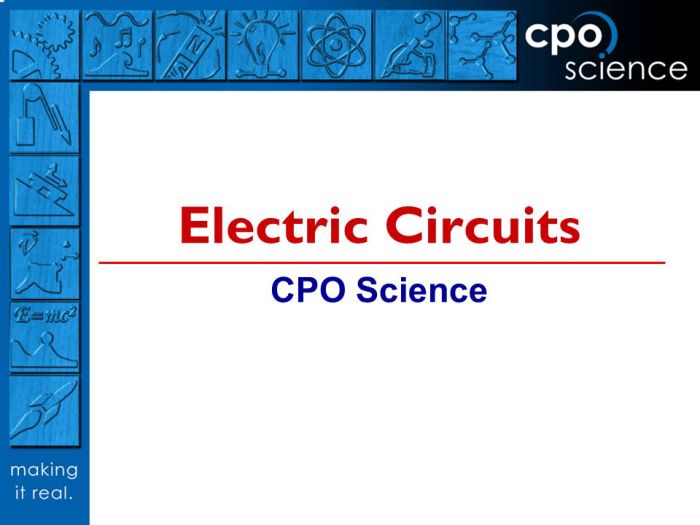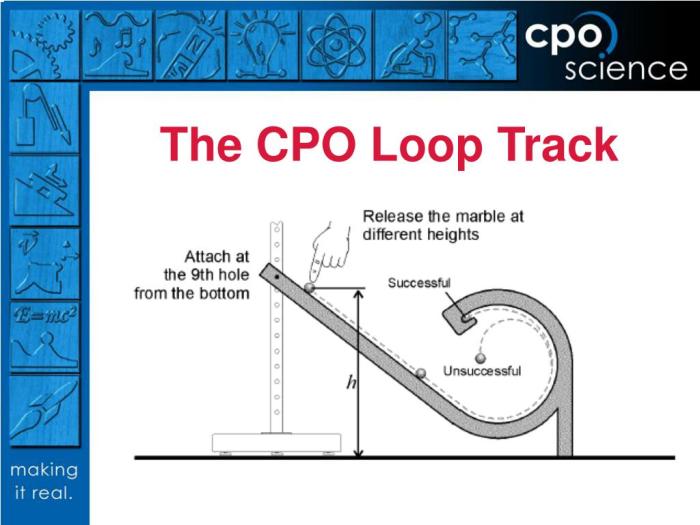CPO Science Foundations of Physical Science is an innovative and engaging science education program that empowers students to explore the fundamental principles of physical science through hands-on investigations and inquiry-based learning. This program aligns with the latest science education standards and provides a solid foundation for students’ future scientific endeavors.
Throughout this guide, we will delve into the conceptual framework, core content, inquiry-based learning approach, assessment strategies, implementation considerations, and impact of CPO Science Foundations of Physical Science. By exploring these aspects, we aim to provide a comprehensive understanding of this transformative program and its potential to enhance student learning and engagement.
Conceptual Framework of CPO Science Foundations of Physical Science

The CPO Science Foundations of Physical Science program is designed to provide students with a deep understanding of the fundamental concepts and principles of physical science. The program is grounded in the belief that students learn best through hands-on experiences and inquiry-based learning.
The program’s overarching goal is to help students develop a strong foundation in physical science that will prepare them for success in future science courses and careers.
The pedagogical approach of the CPO Science Foundations of Physical Science program is based on the constructivist theory of learning. This theory suggests that students construct their own knowledge through active participation in the learning process. The program provides students with a variety of hands-on activities and inquiry-based investigations that allow them to explore and discover scientific concepts for themselves.
The CPO Science Foundations of Physical Science program is aligned with the National Science Education Standards (NSES). The NSES Artikel the essential concepts and skills that all students should learn in science. The CPO Science Foundations of Physical Science program covers all of the major topics in the NSES, including:
- The nature of science
- The structure of matter
- The forces of nature
- The interactions of matter and energy
- The history of science
Core Content and Structure
The CPO Science Foundations of Physical Science program is divided into five units:
- Unit 1: The Nature of Science
- Unit 2: The Structure of Matter
- Unit 3: The Forces of Nature
- Unit 4: The Interactions of Matter and Energy
- Unit 5: The History of Science
Each unit is divided into several chapters. The chapters cover a variety of topics, including:
- The scientific method
- The states of matter
- The laws of motion
- The laws of thermodynamics
- The history of scientific discoveries
The sequence and progression of learning objectives in the CPO Science Foundations of Physical Science program is designed to build upon students’ prior knowledge and skills. The program starts with the basics of science and gradually introduces more complex concepts.
By the end of the program, students will have a strong foundation in physical science that will prepare them for success in future science courses and careers.
The CPO Science Foundations of Physical Science program also emphasizes the interconnections between different concepts and disciplines. The program shows students how the different branches of science are connected and how they work together to explain the world around us.
Inquiry-Based Learning and Hands-on Activities
The CPO Science Foundations of Physical Science program places a strong emphasis on hands-on experiments and investigations. The program provides students with a variety of opportunities to explore and discover scientific concepts for themselves. Students work in small groups to conduct experiments, collect data, and draw conclusions.
The inquiry-based approach of the CPO Science Foundations of Physical Science program helps students develop critical thinking skills and problem-solving skills. Students learn how to ask questions, design experiments, and analyze data. They also learn how to communicate their findings to others.
Here are some examples of inquiry-based activities in the CPO Science Foundations of Physical Science program:
- Students design and conduct an experiment to test the effects of different variables on the rate of a chemical reaction.
- Students build a model of a solar system to learn about the relative sizes and distances of the planets.
- Students research the history of a scientific discovery and present their findings to the class.
These are just a few examples of the many inquiry-based activities in the CPO Science Foundations of Physical Science program. The program provides students with a variety of opportunities to explore and discover scientific concepts for themselves.
Assessment and Evaluation: Cpo Science Foundations Of Physical Science

The CPO Science Foundations of Physical Science program uses a variety of assessment strategies to measure student learning and progress. These strategies include:
- Formative assessments
- Summative assessments
- Performance assessments
Formative assessments are used to assess student learning during the learning process. These assessments help students identify areas where they need additional support. Summative assessments are used to assess student learning at the end of a unit or chapter. These assessments help students demonstrate their understanding of the material.
Performance assessments are used to assess student learning through hands-on activities. These assessments help students demonstrate their ability to apply their knowledge and skills to real-world situations.
The CPO Science Foundations of Physical Science program also provides teachers with a variety of resources to help them assess student learning. These resources include:
- Assessment rubrics
- Student self-assessment checklists
- Online quizzes and tests
These resources help teachers to assess student learning in a fair and consistent manner.
Implementation and Professional Development

The CPO Science Foundations of Physical Science program is designed to be implemented in a variety of settings. The program can be used in traditional classrooms, science labs, and homeschool settings. The program is also available in both print and digital formats.
The CPO Science Foundations of Physical Science program is supported by a variety of professional development resources. These resources include:
- Teacher workshops
- Online courses
- Curriculum materials
These resources help teachers to implement the program effectively and to support student learning.
Here are some examples of successful implementation models for the CPO Science Foundations of Physical Science program:
- A school district in California implemented the program in all of its middle schools. The district reported that the program improved student achievement in science and increased student interest in science careers.
- A charter school in New York City implemented the program in its high school. The school reported that the program helped students to develop critical thinking skills and problem-solving skills.
- A homeschooling family in Texas used the program to teach their children science. The family reported that the program was easy to use and that their children enjoyed learning science.
These are just a few examples of the many successful implementation models for the CPO Science Foundations of Physical Science program.
Impact and Research
The CPO Science Foundations of Physical Science program has been shown to have a positive impact on student learning and engagement. Research studies have found that the program improves student achievement in science and increases student interest in science careers.
One study found that students who used the CPO Science Foundations of Physical Science program scored significantly higher on standardized science tests than students who used a traditional science curriculum.
Another study found that students who used the CPO Science Foundations of Physical Science program were more likely to pursue science careers than students who used a traditional science curriculum.
The CPO Science Foundations of Physical Science program is a well-researched and effective science curriculum. The program has been shown to improve student achievement in science and increase student interest in science careers.
Here are some areas for further research and development:
- The impact of the CPO Science Foundations of Physical Science program on student learning in different settings.
- The effectiveness of the CPO Science Foundations of Physical Science program in preparing students for college and career.
- The development of new and innovative ways to use the CPO Science Foundations of Physical Science program.
Continued research and development will help to ensure that the CPO Science Foundations of Physical Science program continues to be a valuable resource for students and teachers.
Popular Questions
What are the overarching goals of CPO Science Foundations of Physical Science?
The program aims to develop students’ understanding of fundamental physical science concepts, foster their ability to conduct scientific inquiries, and cultivate their critical thinking and problem-solving skills.
How does CPO Science Foundations of Physical Science promote inquiry-based learning?
The program emphasizes hands-on experiments, investigations, and student-led discussions. Students are encouraged to ask questions, make predictions, and design experiments to test their hypotheses.
What assessment strategies are used in CPO Science Foundations of Physical Science?
The program utilizes a combination of formative and summative assessments, including quizzes, lab reports, projects, and end-of-unit exams. These assessments evaluate students’ understanding of concepts, their ability to apply scientific methods, and their critical thinking skills.